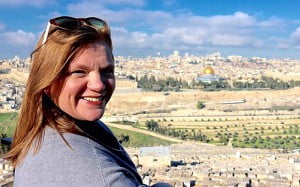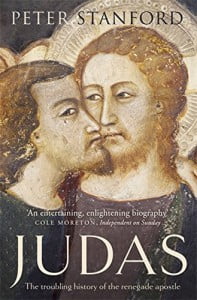Do we walk in the footsteps of Judas?
 On Expert Fri morning, at 9 am, Kate Bottley (known as the Gogglebox vicar) presented a new angle on the Easter story—told from the perspective of Judas. I have to admit to having some misgivings about the approach, more often than not considering of the Telegraph'due south promotional pre-article. There has been a consequent tendency in scholarship to prioritise marginal documents, including the gnostic Gospel of Judas, over the New Testament documents both in relation to theology and history, and I wondered whether this program would be drawn into the contend.
On Expert Fri morning, at 9 am, Kate Bottley (known as the Gogglebox vicar) presented a new angle on the Easter story—told from the perspective of Judas. I have to admit to having some misgivings about the approach, more often than not considering of the Telegraph'due south promotional pre-article. There has been a consequent tendency in scholarship to prioritise marginal documents, including the gnostic Gospel of Judas, over the New Testament documents both in relation to theology and history, and I wondered whether this program would be drawn into the contend.
Every bit it happened, I was pleasantly surprised. Kate did a neat job of introducing the question almost Judas in a creative way, with a display of information in her church building building. She rather nicely kept referring to the Easter bulletin about Jesus in putting her questions:
The story of Easter is about Jesus dying for our sins. Is Judas to be excluded from that?
From the starting time, she was likewise refreshingly direct near the importance of the NT documents.
The accounts of the gospel writers sometime differ, and sometimes overlap, but they are the most reliable source.
And throughout the programme, she acted as a applied and pastoral foil to the diverse scholarly voices that were included—equally I think a presenter on this kind of plan should exercise. And the selection of scholars was very proficient—chief amongst them Simon Gathercole of Cambridge, who was named in the credits as academic consultant (or some such). It included Helen Bond from Edinburgh, Joan Taylor from King's London, Anthony Cane from Chichester Cathedral, and the entertaining Peter Stanford who has written a book on Judas, The troubling history of the renegade apostle.
The scholarly input was, like Kate, consistently positive near the value of the NT documents as reliable sources for understanding Easter and the story of Judas. Simon Gathercole emphasised the contact of writers of the gospels with eyewitnesses of the events that they recount, in line with a stiff, positive current tendency in scholarship, largely promoted by the piece of work of Richard Bauckham. Peter Stanford was even stronger: the not-canonical documents, like the Gospel of Judas, are tardily, unreliable, and equanimous specifically to contradict the emerging orthodox view—we should read them 'at our peril'!
There was a useful exploration of the meaning of Judas' name 'Iscariot'. Was he a member of the violent revolutionary Sicarii? Probably not—his name almost likely means 'man from Kerioth', but if this is a town in the south of the country, and then it means he was an outsider amongst the group of Galilean disciples, who are northerners. Nosotros were reminded of the challenge that, although named concluding and from the beginning introduced every bit 'the one who betrayed Jesus' in the list of apostles, he must take been involved in preaching Jesus' message of the kingdom, in healing and in deliverance in Jesus' proper noun, only like all the others.
The narrative shape of the gospels was taken seriously throughout—at some points too seriously, I felt, amongst the other historical data. Jesus' decision to go to Jerusalem was cardinal, nosotros were told—only that is true only if y'all stick with the shape of Luke'due south gospel, who sets much of Jesus' ministry in the context of existence 'on the manner' to Jerusalem. The historical shape of John's gospel, which is more likely, sees Jesus in the holy metropolis three or four times. We were, though, reminded that Passover was a time of jubilant the liberation of God's people from oppression, creating high political tensions in relation to the occupying Roman forces at the festival. Information technology was a helpful reminder of how shut the language of the NT (which nosotros take tended to spiritualise) was to the political hopes and aspirations of the time.
The historical reconstruction scenes appeared to have been created for the programme, rather than borrowed from another source, and I hope it isn't unkind to suggest that they did not have a large budget. I was disappointed past 1 or two of the historical realities, such as the Concluding Supper appearing to take place on the floor, rather than around the more than likely triclinium (which makes more than sense of John'due south narration of events in detail).
 As the programme moved into the exploration of Judas' motive, there was an impressive convergence between scholarship and pastoral perspectives. The fiscal incentive (highlighted in the mediaeval catamenia every bit early capitalism adult) seemed historically implausible, since the symbolically pregnant 30 pieces of silvery was not big amount of money. Being possessed by the devil, inferred from some comments in the gospels, was also unsatisfying, since (according to Kate) 'evil is part of our human being story.' More than likely is that Judas, longing for a political revolution, was disappointed and frustrated by Jesus' sacrifice of himself.
As the programme moved into the exploration of Judas' motive, there was an impressive convergence between scholarship and pastoral perspectives. The fiscal incentive (highlighted in the mediaeval catamenia every bit early capitalism adult) seemed historically implausible, since the symbolically pregnant 30 pieces of silvery was not big amount of money. Being possessed by the devil, inferred from some comments in the gospels, was also unsatisfying, since (according to Kate) 'evil is part of our human being story.' More than likely is that Judas, longing for a political revolution, was disappointed and frustrated by Jesus' sacrifice of himself.
The most poignant role of the programme came towards the terminate, with the exploration of Judas' despair. Stanford comments:
At that place'south a lot of despair in the world and in human life. I don't meet it much in the gospels—merely I see information technology here.
Kate expressed both her sympathy and frustration with the graphic symbol of Judas, only used that to face the question of choice and decision:
I am disappointed that the light of earth was in front of him and he stepped into darkness.
Her terminal observe, of a subconscious church window in which Judas, as he is hanged, turns to the low-cal, echoed the poem about Judas written past Ruth Etchells:
In Hell there grew a Judas Tree
Where Judas hanged and died
Because he could not conduct to see
His master crucified
Our Lord descended into Hell
And found his Judas in that location
For ever haning on the tree
Grown from his own despair
Then Jesus cutting his Judas down
And took him in his artillery
"Information technology was for this I came" he said
"And non to do you harm
My Father gave me twelve good men
And all of them I kept
Though one betrayed and 1 denied
Some fled and others slept
In three days' time I must return
To make the others glad
But first I had to come up to Hell
And share the death y'all had
My tree will grow in place of yours
Its roots lie hither as well
There is no final victory
Without this soul from Hell"
So when we all condemned him
As of every traitor worst
Think that of all his men
Our Lord forgave him start.
The verse form is cited by Richard Bauckham and Trevor Hart in their study of peopleAt the Cross. Some react against it equally an implausible statement for a kind of universalism—but in the programme Kate held back from that, suggesting that it was Jesus'offer of forgiveness that was universally extended.
The programme turned out to be a refreshing engagement with the Easter story, offering all sorts of pastoral possibilities in reflecting on which aspects of Judas' story (greed? existence an outsider? disappointment? frustration?) nosotros see in ourselves. If you missed information technology last calendar week, lookout man it while yous tin.
Follow me on Twitter @psephizo
Much of my work is done on a freelance basis. If you have valued this mail, would you considerdonating £1.xx a month to support the production of this blog?
If you lot enjoyed this, do share it on social media (Facebook or Twitter) using the buttons on the left. Follow me on Twitter @psephizo. Like my page on Facebook.
Much of my piece of work is done on a freelance ground. If you take valued this post, you can make a single or repeat donation through PayPal:
Comments policy: Good comments that engage with the content of the mail service, and share in respectful fence, can add real value. Seek kickoff to understand, then to be understood. Make the most charitable construal of the views of others and seek to acquire from their perspectives. Don't view contend as a disharmonize to win; address the argument rather than tackling the person.
Source: https://www.psephizo.com/biblical-studies/do-we-walk-in-the-footsteps-of-judas/
0 Response to "Do we walk in the footsteps of Judas?"
Publicar un comentario